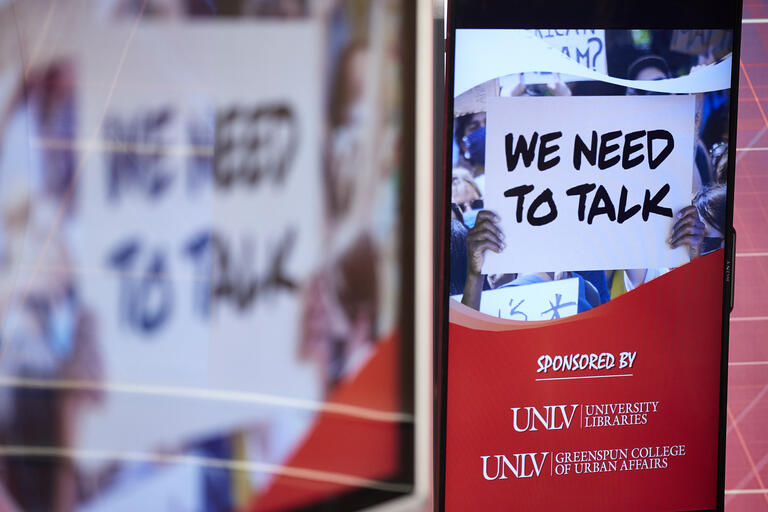The steel beams of the unfinished first floor demanded attention overhead. A throng of dignitaries gathered for the opening of Black Fire Innovation, UNLV’s new technology incubator space at the Harry Reid Research & Technology Park.
Those beams made themselves heard with a loud pop, on cue, as Christian Gardner of the Gardner Co., the builder and partner in the portentous park, addressed the crowd.
“That's normal as a building breaks in,” Gardner deadpanned.
The ground floor of UNLV’s first building at the research park at Sunset and Durango — not far from the massive Switch data center, UFC’s command post, and a slew of corporate headquarters — is still being built out in the present. But up on the fourth floor? There’s a dazzling display of the near future in the form of Black Fire Innovation. The public-private partnership between UNLV and Caesars Entertainment promises to be the testing ground for new ideas in gaming, technology, entertainment, and the integrated resort experience.
Black Fire's 43,000-square-foot facility is the first university-affiliated component of the 122-acre research park, home to a co-working space on the third floor for companies, big and small, that operate in and around the gaming, resort, and tech sectors. Intel has already partnered up with Black Fire, and Panasonic is showcasing its video and display technology in the facility. There’s also office space for both Caesars and UNLV’s Office of Economic Development, whose mission is to attract industry-sponsored research, develop UNLV's intellectual property, and partner with companies and organizations to bring new products to market.
The fourth floor — the heart of the integrated resort lab — was pumping on the day of the grand opening. Three UNLV students lined up on one side of Black Fire’s model esports studio to take on a team from Caesars in an ongoing battle in the game Rocket League. Traditional blackjack tables, draped in Paris Las Vegas felt, hinted at a new side bet being tested: the “Buster Blackjack” pays players depending on how many cards it takes the dealer to bust. Slot machines from nearby gaming developer IGT hugged the walls while a mock sportsbook posted simulated Super Bowl lines as a recast of the AFC championship game between the Chiefs and Titans dominated on a floor-to-ceiling screen.
Off this casino floor is Black Fire’s bar, coffee shop, and dining room test space. In one corner, local virtual reality company DreamlandXR offered demos of its VR Arcade — a glimpse of the potential for virtual and augmented reality to be incorporated into resorts. Beyond that, two mock guest rooms allow hospitality students to experiment with new in-room experiences.
“Walking through this space today makes you realize all the hard work is going to pay off,” said Zach Miles, associate vice president for economic development. “All the ideas are going to come to fruition. I'm extremely excited about it, but I'm much more excited about the next stage.”
Miles is ready for the dam to release on Black Fire: “We'll open those gates, and those projects will start to flow. Whether it's from the companies we have downstairs — the Panasonics, the Intels — and the student projects to the community at large.”
Black Fire is not exclusive to Caesars; other companies will be afforded the opportunity to use the space to innovate. It highlights the center’s ability to act as an incubator and UNLV’s role in using its research resources to spur economic development.
But for students, UNLV is enriching their experience in a whole new way through Black Fire and the emerging partnerships at the Research Park. Students will benefit from working shoulder-to-shoulder with those already in the field in the course of their classwork. And in the third-floor co-working space, they will have the chance to bridge the gap between academic life and the post-graduate world; a space where their ideas first started as Rebels can be tested and developed.
“The academic and economic benefits of the research park are strong,” said Gov. Steve Sisolak said on opening day. The park creates “opportunities for collaboration between industry and academia that simply aren't possible on many college campuses today. They attract new, high-tech businesses to spark the flow of ideas between universities, private businesses, and research laboratories.”

On Thursday, former U.S. Senate majority leader Harry Reid, the research park’s namesake, was joined by Sisolak, UNLV President Marta Meana, County Commissioner Michael Naft, Caesars Entertainment CEO Tony Rodio, and others on stage to cut the ribbon on Black Fire.
“This will benefit Nevada for many years to come," Reid said. "Many people were involved in this project. I was involved in getting the legislation passed in Washington, but to be honest with you, I didn't know it would end up like this.
“It used to be any time you had a new ceremony, you’d place a cornerstone. That’s kind of what we have here today. This facility is a cornerstone of this 120 acres.”



